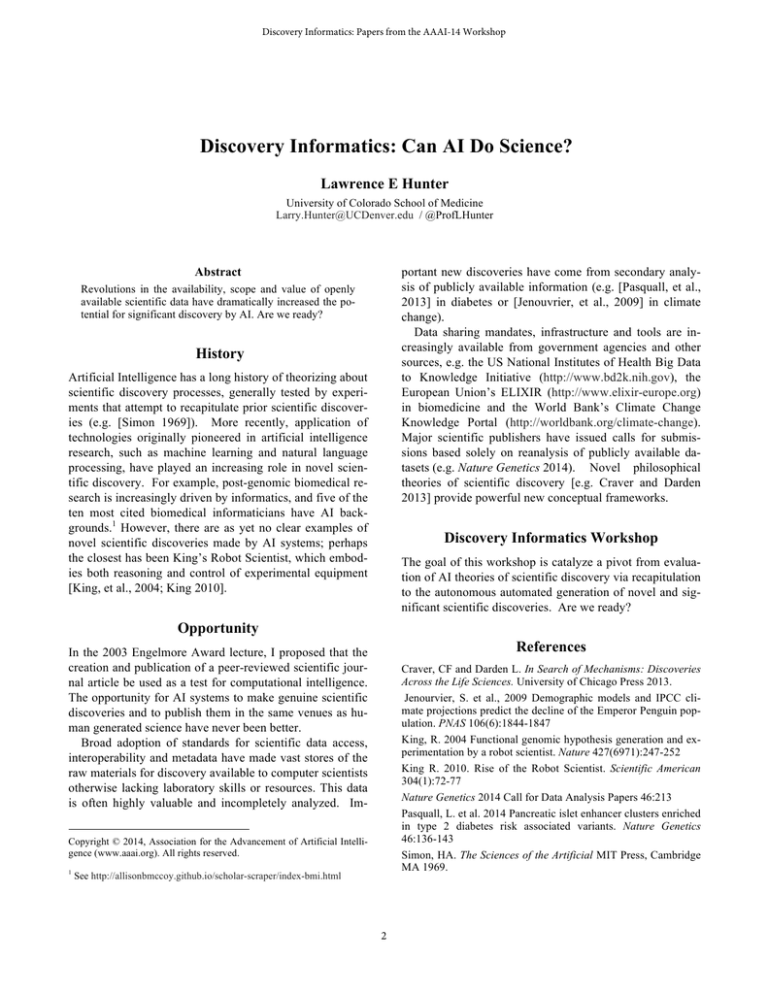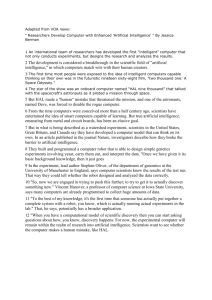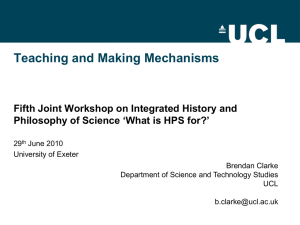
Discovery Informatics: Papers from the AAAI-14 Workshop
Discovery Informatics: Can AI Do Science?
Lawrence E Hunter
University of Colorado School of Medicine
Larry.Hunter@UCDenver.edu / @ProfLHunter
Abstract
portant new discoveries have come from secondary analysis of publicly available information (e.g. [Pasquall, et al.,
2013] in diabetes or [Jenouvrier, et al., 2009] in climate
change).
Data sharing mandates, infrastructure and tools are increasingly available from government agencies and other
sources, e.g. the US National Institutes of Health Big Data
to Knowledge Initiative (http://www.bd2k.nih.gov), the
European Union’s ELIXIR (http://www.elixir-europe.org)
in biomedicine and the World Bank’s Climate Change
Knowledge Portal (http://worldbank.org/climate-change).
Major scientific publishers have issued calls for submissions based solely on reanalysis of publicly available datasets (e.g. Nature Genetics 2014). Novel philosophical
theories of scientific discovery [e.g. Craver and Darden
2013] provide powerful new conceptual frameworks.
Revolutions in the availability, scope and value of openly
available scientific data have dramatically increased the potential for significant discovery by AI. Are we ready?
History
Artificial Intelligence has a long history of theorizing about
scientific discovery processes, generally tested by experiments that attempt to recapitulate prior scientific discoveries (e.g. [Simon 1969]). More recently, application of
technologies originally pioneered in artificial intelligence
research, such as machine learning and natural language
processing, have played an increasing role in novel scientific discovery. For example, post-genomic biomedical research is increasingly driven by informatics, and five of the
ten most cited biomedical informaticians have AI backgrounds.1 However, there are as yet no clear examples of
novel scientific discoveries made by AI systems; perhaps
the closest has been King’s Robot Scientist, which embodies both reasoning and control of experimental equipment
[King, et al., 2004; King 2010].
Discovery Informatics Workshop
The goal of this workshop is catalyze a pivot from evaluation of AI theories of scientific discovery via recapitulation
to the autonomous automated generation of novel and significant scientific discoveries. Are we ready?
Opportunity
References
In the 2003 Engelmore Award lecture, I proposed that the
creation and publication of a peer-reviewed scientific journal article be used as a test for computational intelligence.
The opportunity for AI systems to make genuine scientific
discoveries and to publish them in the same venues as human generated science have never been better.
Broad adoption of standards for scientific data access,
interoperability and metadata have made vast stores of the
raw materials for discovery available to computer scientists
otherwise lacking laboratory skills or resources. This data
is often highly valuable and incompletely analyzed. Im-
Craver, CF and Darden L. In Search of Mechanisms: Discoveries
Across the Life Sciences. University of Chicago Press 2013.
Jenourvier, S. et al., 2009 Demographic models and IPCC climate projections predict the decline of the Emperor Penguin population. PNAS 106(6):1844-1847
King, R. 2004 Functional genomic hypothesis generation and experimentation by a robot scientist. Nature 427(6971):247-252
King R. 2010. Rise of the Robot Scientist. Scientific American
304(1):72-77
Nature Genetics 2014 Call for Data Analysis Papers 46:213
Pasquall, L. et al. 2014 Pancreatic islet enhancer clusters enriched
in type 2 diabetes risk associated variants. Nature Genetics
46:136-143
Simon, HA. The Sciences of the Artificial MIT Press, Cambridge
MA 1969.
Copyright © 2014, Association for the Advancement of Artificial Intelligence (www.aaai.org). All rights reserved.
1
See http://allisonbmccoy.github.io/scholar-scraper/index-bmi.html
2





